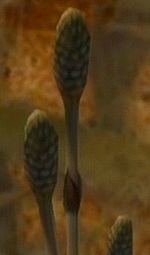Horsetail: Difference between revisions
Jump to navigation
Jump to search
Jelloratbob (talk | contribs) m (Somehow I doubt that it was the horsetail appearing in Pikmin 2, not real life, that inspired its appearence in Paper Mario.) |
m (change to new-style notes) |
||
| Line 13: | Line 13: | ||
Horsetails also have a small cameo appearance in two other Nintendo games named ''[[mariowiki:Paper Mario: The Thousand-Year Door|Paper Mario: The Thousand-Year Door]]'' and ''[[mariowiki:Super Paper Mario|Super Paper Mario]]'', in which they restored 3 HP and 7 HP respectively, if eaten. | Horsetails also have a small cameo appearance in two other Nintendo games named ''[[mariowiki:Paper Mario: The Thousand-Year Door|Paper Mario: The Thousand-Year Door]]'' and ''[[mariowiki:Super Paper Mario|Super Paper Mario]]'', in which they restored 3 HP and 7 HP respectively, if eaten. | ||
{{Notes| | {{Notes|olimar=y|louie=y}} | ||
==Artwork== | ==Artwork== | ||
<gallery> | <gallery> | ||
Revision as of 10:41, March 29, 2012
| Horsetail | |
|---|---|

| |
| Appears in | Pikmin 2 |
| Scientific name | Equestrius vindico |
| Family | Horsetail |
| Areas | Awakening Wood |
| Caves | Hole of Beasts |
| Challenge Mode levels | None |
| 2-Player Battle levels | None |
The Horsetail is a plant in Pikmin 2. The plant is brownish and stiffly sticks out of the ground like a post. This hardy plant can survive in soil conditions with few nutrients, but is still very rarely seen, only appearing in the Awakening Wood and underground in the Hole of Beasts. Horsetails, unlike most plants, have retained the primitive method of reproducing via spores.
Horsetails also have a small cameo appearance in two other Nintendo games named Paper Mario: The Thousand-Year Door and Super Paper Mario, in which they restored 3 HP and 7 HP respectively, if eaten.
Notes
Olimar's notes
“This variety of horsetail is prevalent in regions with low nutrient content in the soil. Unlike most other plants, this particular species propagates itself through the release of spores.”
Louie's notes
“Remove and discard the primitive, scaly leaves, then blanch the tender stock in a buttery broth.”
Artwork
External links
Wikipedia: Equisetum genus (horsetails)